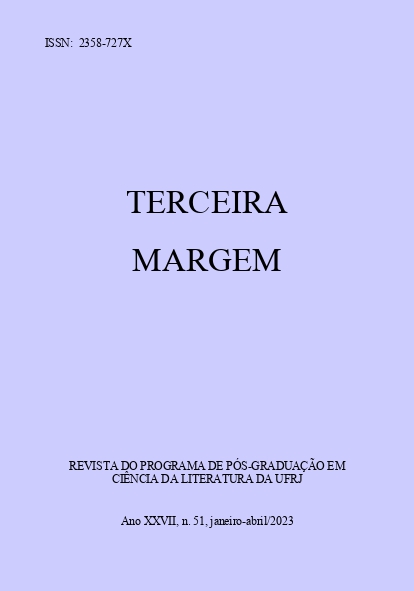Performances de poesia na página e no palco: reflexões a partir do slam. Tradução do capítulo “Poetry performances on the page and stage: insights from slam”, de Helen Johnson [née GREGORY], do livro Listening up, writing down, and looking beyond, de Susan Gingell & Wendy Roy (eds).
DOI:
https://doi.org/10.55702/3m.v27i51.58337Resumo
Tradução do capítulo “Poetry performances on the page and stage: insights from slam”, de Helen Johnson [née GREGORY], do livro Listening up, writing down, and looking beyond, de Susan Gingell & Wendy Roy (eds). Waterloo: Wilfrid Laurier University Press, 2012. ISBN 978-1-55458-364-5
Por Daniela Silva de Freitas e Maria Eduarda Faraco Avila e Silva.
Downloads
Referências
Miles. Dir. Curtis Hanson. Written by Scott Silver. Perfs. Eminem, Brittany Murphy, Kim Bassinger, Mekhi Phifer, Evan Jones. Universal Studios, 2003. DVD.
BARTHES, Roland. Image, Music and Text. Trans. and ed. Stephen Heath. London: Fontana, 1997.
BAUGH, Edward. “Poem, Reading, Performance.” Caribe 2000: Regional and/or National Definitions, Identities and Cultures. Ed. Lowell Fiet and Janette Becerra. San Juan: Faculty of Humanities, U of Puerto Rico, 1999, p. 38-45.
BECKER, Howard S. Art Worlds. California: U of California P, 1982.
BENNETT, Andy. Popular Music and Youth Culture: Music, Identity and Place. Basingstoke: Palgrave, 2000.
BERNSTEIN, Charles. “Introduction.” Close Listening: Poetry and the Performed Word. Ed. Charles Bernstein. Oxford: Oxford UP, 1998, p. 3-26.
BOURDIEU, Pierre. Distinction: A Social Critique of the Judgement of Taste. Trans. Richard Nice. London: Routledge, 1989.
BURMAN, Erica, and PARKER, Ian (eds.). Discourse Analytic Research: Repertoires and Readings of Texts in Action. London: Routledge, 1993.
CARMICHAEL, Glenn, and ARBURY, Sara-Jane (eds.). The Bristol Slam Anthology. Bristol: Pimp$ of the Alphabet, 1998.
ELEVELD, Mark, and SMITH, Marc (eds.). The Spoken Word Revolution. Illinois: Sourcebooks, 2004.
FOLEY, John Miles. How to Read an Oral Poem. Urbana: U of Illinois P, 2002.
GENETTE, Girard. Paratexts: Thresholds of Interpretation. Trans. Jane E. Lewin. Cambridge: Cambridge UP, 1997.
GIOIA, Dan. Disappearing Ink: Poetry at the End of Print Culture. St. Paul: Graywolf, 2004.
GLAZNER, Gary Mex (ed.). Poetry Slam: The Competitive Art of Performance Poetry. California: Manic D, 2000.
GREGORY, Helen. “Studying Slam. Part I.” Metaroar. 2007a.
GREGORY, Helen. “Studying Slam. Part II.” Metaroar. 2007b.
GREGORY, Helen. “(Re)presenting Ourselves: Art, Identity and Status in U.K. Poetry Slam.” Oral Tradition 23.2, 2008, p. 201-217.
GREGORY, Helen. “The Quiet Revolution of Poetry Slam: The Sustainability of Cultural Capital in the Light of Changing Artistic Conventions.” Ethnography and Education 3.1, 2009, p. 61-71.
GRISWOLD, Wendy. Renaissance Revivals: City Comedy and Revenge Tragedy in the London Theater, 1576-1980. Chicago: U of Chicago P, 1986.
GRISWOLD, Wendy. Cultures and Societies in a Changing World. 2nd ed. California: Sage, 2004.
HEINTZ, Kurt. An Incomplete History of Slam. 3rd ed. 1999. Disponível em: <http://www.e-poets.net/library/slam/>. Acesso em: 10 mar. 2023.
HOLMAN, Bob. “Congratulations. You Have Found the Hidden Book: Invocation.” Aloud: Voices from the Nuyorican Poets Cafe. Ed. Miguel Algarín and Bob Holman. New York: Henry Holt, 1994, p. 1-3.
KRIPPENDORFF, Klaus. Content Analysis: An Introduction to Its Methodology. 2nd ed. California: Sage, 2004.
MACKEAN, Ian. The Essentials of Literature in English Post-1914. London: Hodder Arnold, 2005.
MAHTANI, Minelle, and SALMON, Scott. “Site Reading? Globalization, Identity, and the Consumption of Place in Popular Music.” Popular Culture: Production and Consumption. Ed. C. Lee Harrington and Denise D. Bielby. Malden: Blackwell, 2001, p. 165-179.
MATTHEWS, Kevin. “Site of Slam”. Canadian Theatre Review 130 (2001): 47-51.
MCGANN, Jerome J. A Critique of Modern Textual Criticism. Chicago: U of Chicago P, 1983.
MCKENZIE, D. F. Bibliography and the Sociology of Texts. Cambridge: Cambridge UP, 1999.
MIDDLETON, Peter. “The Contemporary Poetry Reading.” Close Listening: Poetry and the Performed Word. Ed. Charles Bernstein. Oxford: Oxford UP, 1998, p. 262-99.
MIDDLETON, Peter. “How to Read a Reading of a Written Poem.” Oral Tradition 20.1 (2005): 7–34. Disponível em: <https://journal.oraltradition.org/wp-content/uploads/files/articles/20i/Middleton.pdf>. Acesso em: 10 mar. 2023.
PFEILER, Martina. Sounds of Poetry: Contemporary American Performance Poets. Tübingen: Gunter Narr Verlag, 2003.
POETRY Slam Inc. The Official 2008 PSI Handbook. Whitmore Lake: Wordsmith, 2008.
QUALIFICATIONS and Curriculum Authority. Qualifications and Curriculum Authority Website. 2008. Disponível em: <https://www.gov.uk/government/publications/qualifications-and-curriculum-authority-annual-report-and-accounts-2007-to-2008>. Acesso em: 10 mar. 2023.
ROBINSON, Paul A. Opera, Sex, and Other Vital Matters. Chicago: U of Chicago P, 2002.
SHEPPARD, Robert. The Poetry of Saying: British Poetry and Its Discontents, 1950-2000. Liverpool: Liverpool UP, 2005.
SILLIMAN, Ron. “Who Speaks: Ventriloquism and the Self in the Poetry Reading”. Close Listening: Poetry and the Performed Word. Ed. Charles Bernstein. Oxford: Oxford UP, 1998, p. 360-378.
SMITH, Marc, and KRAYNAK, Joe. The Complete Idiot’s Guide to Slam Poetry. Indianapolis: Alpha Books, 2004.
SOMERS-WILLETT, Susan B. Anthony. “Slam Poetry: Ambivalence, Gender, and Black Authenticity in ‘Slam’”. Text, Practice, Performance III (2001): 37-63.
Downloads
Publicado
Edição
Seção
Licença
Autores que publicam nesta revista concordam com os seguintes termos:
- a. Autores mantém os direitos autorais e concedem à revista o direito de primeira publicação, com o trabalho simultaneamente licenciado sob a Licença Creative Commons Attribution que permite o compartilhamento do trabalho com reconhecimento da autoria e publicação inicial nesta revista.
- b. Autores têm autorização para assumir contratos adicionais separadamente, para distribuição não-exclusiva da versão do trabalho publicada nesta revista (ex.: publicar em repositório institucional ou como capítulo de livro), com reconhecimento de autoria e publicação inicial nesta revista.
- c. Autores têm permissão e são estimulados a publicar e distribuir seu trabalho online (ex.: em repositórios institucionais ou na sua página pessoal) a qualquer ponto antes ou durante o processo editorial, já que isso pode gerar alterações produtivas, bem como aumentar o impacto e a citação do trabalho publicado (Veja O Efeito do Acesso Livre).

